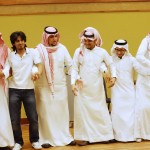Haley Russell
Assistant News Editor

Students gathered in the Curris Center Saturday to celebrate Eid-al-Ftir, an Islamic holiday indicating the end of fasting after Ramadan and the month of Shawal.
The celebration lasted for several hours and was a time when Muslim students on campus and members of the community ate dinner together, socialized and played games.
Before the festivities, Ihsan Alkhatib, assistant professor of humanities and fine arts, said the group prayed and were then separated by gender for dinner.
Alkhatib said the event was a way for the Muslim Student Organization, The United Arab Emigrants and Saudi Student Organization to promote a feeling of family.
What is Eid-al-Ftir?
• Muslim holiday, recognizing the end of Ramadan, the Islamic holy day of fasting.
• The holiday is typically celebrated in a
festival-type atmosphere with many brethren present.
• The holiday is marked by a unique prayer,
consisting of several lifting of one’s hands
and ears to Allah.
“It’s to create a community feeling,” he said. “I lived in a community that had a lot of Muslims … you have an environment where you can get food and here, they stand out. So in a way they feel isolated, so they get together to create this kind of community.”
Eid-al-Ftir fell a few days prior to the event, Alkhatib said, but the group could not celebrate because of classes and other daily activities.
In Arabic countries, school is canceled to allow for prayer and time with family, he said.
Ibraheem Alkahtani, freshman from Saudi Arabia, said the party’s guests varied in nationality. Saudi Arabian, Jordanian and Lebanese students and families were all present.
Alkahtani said one of the goals of the Muslim organizations on campus is to teach the residents on campus about Muslim culture.
“We have some ambitions to share with other people from other cultures to come to understand our culture,” he said. “Because we have a big, bad challenge in this country, in the United States, beginning from the 9/11 events and that makes us more anxious. I believe, and my citizens also, they believe they have a strong responsibility to show the people that we are peaceful people, that we are friendly people.”
Alkahtani said part of the Eid-al-Fitr holiday is to show they are advocates of peace and to introduce their culture to others.
“It’s important to meet together and to discover our Muslim friends because we only see them (a few) times a year,” he said. “It’s a good chance to come together and see some of our citizens.”
Abdulrahman Yarali, associate professor of engineering and technology and adviser for MSO, said people celebrate Eid-al-Ftir in a variety of ways, while most conform to a set of guidelines pointed out in the Quran.
“Muslims, they celebrate in different ways, but they all come to wake up early in the morning, put the best dress that they have, give money to kids, give money to poor people, get together in a mosque or outdoors together, pray to God and then they eat together and they celebrate,” he said.
Eid-al-Ftir is a time of reflection, Yarali said.
“(Islam) says whether we were lucky or not, whether we were a good person or not, whether we were to go and follow the way God, Allah, wants,” he said.
The time of fasting prior to Eid-al-Ftir is a way Muslims connect to the hungry or poor, Yarali said, and make room in busy schedules for uninterrupted prayer.
The holiday is not recognized in most American cultures, Yarali said.
He said most students cannot celebrate the holiday until after school is over.
“It’s unfortunate that it’s supposed to be a holiday because we have about 15 million Muslims in the United States.” Yarali said. “Here at Murray State, we have about 300 students who are Muslim and usually this is a holiday for them, they need to be off campus or off school without being penalized, but that has not happened yet.”
He said this will allow the students to have an actual holiday as they would in Arabic countries.
“If it’s official, then the students have a feeling that it’s really a holiday,” he said. “They feel that it is a real holiday. Some of the Muslim students would like to see that they would recognize this day as a holiday so they are allowed to be excused for that particular day.”
It is important for students and members of the community to gather, Yarali said.
“It’s important for them to get together to be recognized, that there is another group of people of a different religion with other religions that they are here and they want to be recognized and they want to be respected.”
This expectation comes from an Islamic teaching of coexistence, he said.
Said Yarali: “They expect people to recognize them, at the same time, Muslim students are trying to show Christians that, although we have different religions and we have differences, but the different religion, any religion should not be a source of anger, animosity or hostility. The basic teaching of Islam is coexisting, that we are able to coexist with Christians and Jews.”
Contact Russell